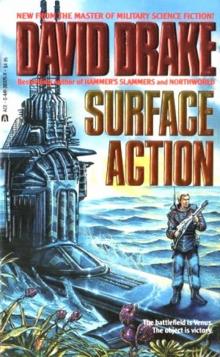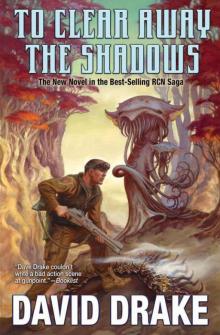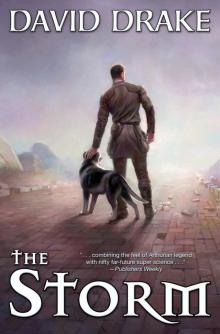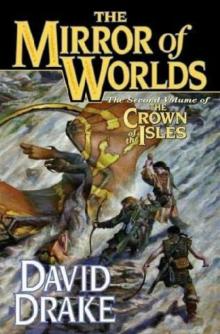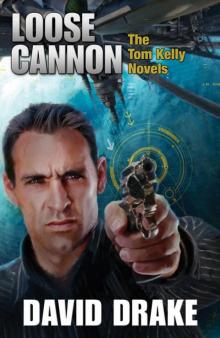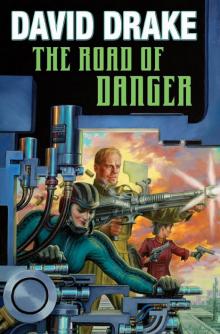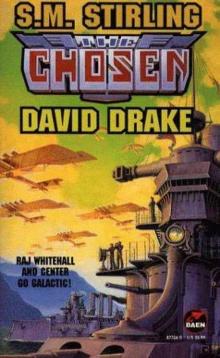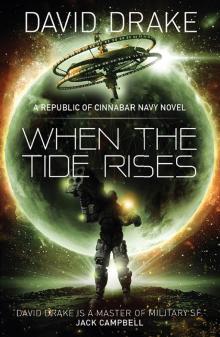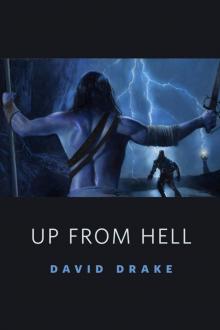Surface action, p.1
Surface Action, page 1





Bestselling author David Drake has written an explosive novel of war-at-sea as thrilling and plausible as his classic HAMMER’S SLAMMERS. An all-new masterwork of military adventure… SURFACE ACTION
PRAISE FOR DAVID DRAKE’S PREVIOUS NOVELS:
“A serious book…
with real people fighting real conflicts.”
-JERRY E.POURNELLE
“A tense, fast-paced thriller!”
-SCIENCE FICTION CHRONICLE
“The action moves along…
a good read”- ABORIGINAL SF
“Hard-hitting… rich,
descriptive prose…
exceptionally noteworthy.” - VOYA
Beast of War
A thirty-foot-long iguana—its ancestors had been iguanas—poked its head through a mass of reeds and came on at a rush. Green Prime was staring straight at the creature when it began its charge.
Green Prime knelt and aimed his weapons pod. Johnnie, struggling to free himself from his pack, saw the four rocket nozzles staring back at him. He flung himself to the side, abandoning his rifle.
“Watch it, you damned—” shouted Sergeant Britten.
Green Prime’s first rocket ignited. The man who’d been beside Johnnie hadn’t moved. The backblast caught him, and his flamethrower reload exploded.
The scream and white-hot glare of fuel threw the rocketeer off. The remainder of his ripple-fired pod raked foliage to the side of the intended target.
The first missile glanced from the lizard. The beast clamped its jaws over the rocketeer’s torso, then spewed out the remains in a froth of blood as it twisted for another victim …
Ace Books by David Drake
HAMMER SLAMMERS
DAGGER
NORTHWORLD
SURFACE ACTION
NORTHWORLD 2: VENGEANCE
(coming in April 1991)
Ace Books by David Drake and Janet Morris
KILL RATIO
TARGET
Ace Books Edited by David Drake and Bill Fawcett
The Fleet Series
THE FLEET: COUNTERATTACK
THE FLEET: BREAKTHROUGH
THE FLEET: SWORN ALLIES
THE FLEET: TOTAL WAR
SURFACE ACTION
DAVID DRAKE
ACE BOOKS, NEW YORK
For Mark L. Van Name
Who has made my life easier
as well as more interesting.
This book is an Ace original edition,
and has never been previously published.
SURFACE ACTION
An Ace Book / published by arrangement with
the author
PRINTING HISTORY
Ace edition / October 1990
All rights reserved.
Copyright © 1990 by David Drake.
Cover art by Tony Roberts.
Author photo copyright © 1989 by Beth Gwinn.
This book may not be reproduced in whole
or in part, by mimeograph or any other means,
without permission. For information address:
The Berkley Publishing Group,
200 Madison Avenue, New York, NY 10016.
ISBN: 0-441-36375-X
Ace Books are published by The Berkley Publishing Group,
200 Madison Avenue, New York, New York 10016.
The name “ACE” and the “A” logo
are trademarks belonging to Charter Communications, Inc.
PRINTED IN THE UNITED STATES OF AMERICA
10 9 8 7 6 5 4 3 2 1
Prologue
And we are here as on a darkling plain
Swept with confused alarms of struggle and flight
Where ignorant armies clash by night.
—Matthew Arnold
FIVE HUNDRED YEARS before the first colony ship landed on Venus, an asteroid which had been expanded into a fat nickel-iron balloon impacted with the upper Venerian atmosphere. There it spread its filling of tailored bacteria to graze among the roiling hydrocarbons.
That was the start of the terraforming process.
Thousands of asteroid casings followed the first. All the early ones were loaded with bacteria which broke down the poisons, forming free water through biochemical processes and creating mulch as they died and their bodies drifted toward the surface.
The upper layers of the atmosphere cleared and no longer trapped the sun’s heat. The blankets of bacteria moved lower, following the hellish temperatures and poisonous hydrocarbons in which alone they could exist.
Rain fell—and vaporized again, long before the huge lashing drops had reached the surface. Furnace-hot layers of air cooled and cleared, and the rain continued to fall.
Even before the Venerian highlands rose above the remaining strata of hydrocarbon haze, asteroids spewed seeds, spores, and Earth-standard one-celled life into the atmosphere. The new cargoes spread and fell with the rain; and mostly died, but not quite all.
Men sent more asteroids filled with more life, and the life flourished.
The sheen of water-vapor clouds reflected the dangerous majority of sunlight from the re-formed planet, but the short, higher-energy end of the spectrum penetrated the clouds most easily. The actinic rays aided mutation, and the virgin surface of the planet permitted adaptive radiation on a scale never imaginable on Earth.
Asteroids strewed eggs; at first invertebrates, then those of backboned life forms, though none so advanced that the young required parental care.
The colony ships arrived.
In a degree, the planners who seeded Venus with life had been too successful. Land and sea both teemed with a savage parody of ‘Nature red in fang and claw.’
The seas proved easier to colonize—‘at first,’ the planners said, though the temporary expedient quickly hardened to permanence. Domed cities sprang up on continental shelves a few thousand feet down—beneath the sunlight and the light-driven violence of the surface layers, but well above the scarcely less fierce competition in the deep trenches where all organic matter at last settled.
Seven days, four hours, and thirty-four minutes after the last colony ship landed on Venus, Earth’s final war triggered a fusion reaction in her oceans. By astronomical standards, the resulting star was both small and short-lived; but it would smolder for thousands of years, and its first milliseconds had been enough to cleanse the planet of life.
Mankind survived in the domes of Venus.
Only in the domes of Venus.
The individual cities were independent and fiercely competitive, though the causes of their conflicts had no more logic to those not involved than did the causes of men’s wars through the previous ages. Earth’s blazing death throes imposed order of a kind on the wars of Venus, but not even that warning trauma could bring peace.
Nuclear power and weapons were banned, as guns had been banned in Japan during the Shogunate. The ban was enforced with absolute ruthlessness. Domed cities were vulnerable to conventional weapons of the simplest sort. A dome which was believed to harbor nuclear experiments was cracked so that water pressure crushed its inhabitants into ooze before they could drown.
Apart from that, war on Venus was fought on the surface, and by warriors.
Independent contractors, like the condottieri of Renaissance Italy, built bases and fleets with private funding and staffed them with volunteers. They fought one another for hire, and in the interim they fought the jungles for their very lives.
Domes went to war according to set rules. When battle and mercenaries’ blood had decided the point at issue, the losing city ransomed itself to penury. The winning dome recouped the cost of the fleet it hired, and the winning military entrepreneurs collected a comfortable victory bonus.
The losing mercenaries had the amount of their original hire and whatever they had managed to save from the wrack of defeat. That might be enough for them to go on to lesser contracts, desperately trying to rebuild their fortunes; or they might be forced to merge with another company on unfavorable terms.
Sometimes they merged with the fleet which had just defeated them. Business was business.
The fleets seemed a romantic alternative to life in the climate-controlled safety of the domed cities. Civilians aped the dress and manners of the mercenaries or scorned them, but no one in the domes could ignore fleet personnel in their uniforms and their dark-tanned skins.
There was no shortage of volunteers to take up the reality of the romantic challenge. …
1.
A taster of wine, with an eye for a maid, Never too bold, and never afraid. . . .
—Bliss Carman
THE CROWD IN Carnaval finery burst apart with a collective shriek.
The man forcing his way toward Johnnie through the revelers had a stubble beard and a wild look in his eyes. His left arm clamped a woman against his chest like the figurehead of a packet ship. Her domino mask hung from one ear. There were scratches on her collarbone, and the gauzy blouse had been shredded away from her breasts.
The man’s right hand waved a butcher knife with an eight-inch blade.
“All right, you whore!” the man screamed. His dilated pupils weren’t focused on anything in his present surroundings. “You want to spread it around, I’ll help you spread it around!”
The knife slipped like a chord of light-struck ripple toward the woman’s belly.
Johnnie’s right hand dropped as he swung his hips to the left. The hem of his scarlet tunic had tiny weights in it, so that the ruffed flare stood out as his body moved—
Clearing the pisto
The woman’s body shielded all of the madman except his arms and the wedge of face including his staring, bloodshot eyes. The Carnaval crowd was a montage of silks and shrieks surrounding the event.
Johnnie’s hand curved up with the pistol; faster than a snake striking, faster than the knife. For an instant that trembled like the sun on dew, the line of the pistol barrel joined Johnnie’s eye and the madman’s.
The muzzle lifted with a flash and a haze of clean-burning propellant. The sharp crack! of muzzle blast slapped through the screams. The madman’s right eye socket was empty as his body spasmed backward in a tetanic arch. His arms lashed apart, flinging the woman to one side and the butcher knife to the other.
Johnnie took a deep breath and loaded a fresh magazine from the pouch on his left hip, where it balanced the weight of the pistol. The holographic ambiance faded, leaving behind a large room whose walls were gray with a covering of vitalon, a super-cooled liquid which absorbed bullet impacts within its dense interior.
A red light glowed on the wall above the door. Somebody was in the anteroom, watching the sequence through closed-circuit cameras.
The muscles of Johnnie’s lean face set in a pattern scarcely recognizable as the visage of the good-looking youth of a moment before. He holstered his weapon and touched the door control.
“Well,” he said as the armored door rotated and withdrew, “are you satisfied, Sena—”
The man in the anteroom wore a Blackhorse dress uniform, with the gold pips and braid of a commander. His only similarity to Senator A. Rolfe Gordon was that both men were in their mid-forties—
And they’d been brothers-in-law before the Senator’s wife ran off with a mercenary not long after she gave birth to Johnnie.
“Uncle Dan!” cried Johnnie. He started toward Commander Daniel Cooke with his arms wide … before he remembered that what was proper for a boy of nine should have been outgrown by nineteen. He drew back in embarrassment.
Uncle Dan gave him a devil-may-care grin and embraced Johnnie. “What’s the matter?” he demanded. “Did I develop skin-rot since I last saw you?”
He stepped back and viewed the younger man critically. “Though I won’t,” he said, “offer to swing you up in the air any more.”
“Gee, it’s good to … ,” Johnnie said. “I wasn’t expecting to see you.”
“I have a meeting with the Senator this morning,” Dan explained. “And I thought I’d come a little early to see my favorite nephew.”
“Ah … shall we go somewhere comfortable?”
“If you don’t mind,” replied his uncle, “I’d like to watch you run through a sequence or two.”
Dan’s smile didn’t change, but his voice was a hair too casual when he added, “The Senator comes to watch you frequently, then?”
“No,” said Johnnie flatly. “Not often at all. But too often.”
His face cleared. “But I’d love to show you the set-up, Uncle Dan. The screens in the anteroom—”
“I’d prefer to be in the simulator with you,” Dan said. He lifted his saucer hat and ran his fingers through his black, curly hair. “Though I won’t be shooting.”
“There’s some danger even with the—” Johnnie began until his uncle’s brilliant grin stopped him.
Right, explain the danger of ricochets to Commander Daniel Cooke, whose ship took nine major-caliber hits three months ago while blasting her opponent in Squadron Monteleone to wreckage.
“Sorry, Uncle Dan.”
“Never apologize for offering information that might save somebody’s life,” Dan said. “Got a jungle sequence in this system?”
“This system’s got about everything!” Johnnie answered with pride as the gray walls dissolved into a mass of stems, leaves, and dim green terror. As the holographic simulation appeared, the climate control raised sharply the temperature and humidity of the air it pumped into the environment.
They were on the edge of a clearing, a dimpled expanse of yellow-brown mud. The surface was too thin to provide purchase for any plants save those which crawled about slowly on feather-fringed roots. Creatures with armored hides had trampled a path around the periphery of the clearing, through the brambles that were now curling to reclaim the terrain.
A bubble rose from the mud and burst flatulently.
“The trouble with the simulator,” Johnnie said in a whisper, “is that you know there’s something there in the mud.”
The air was still and as moist as a sponge.
“Which makes it exactly like the land anywhere on Venus’ surface,” said his uncle, also speaking quietly. “Go on, then.”
Johnnie took a step forward. If he’d been expecting to run a jungle sequence, he’d have equipped himself with a powered cutting-bar and a more powerful handgun… .
His left arm brushed aside a curtain of gray tendrils, roots hanging from an air plant to absorb water from the atmosphere—and to entangle small flying creatures whose juices would be absorbed to feed the plant. The simulator couldn’t duplicate the touch of vegetation, but a jet of air stroked Johnnie’s sleeve to hint at the contact.
A swamp-chopper exploded toward them from the oozing muck.
Johnnie drew and fired. His thumb rocked the grip’s feed-switch forward even as the first two rounds of explosive bullets cracked out, shattering the creature’s stalked eyes.
Johnnie threw himself sideways. He fired the remainder of the magazine as solids which could penetrate the swamp-chopper’s armored carapace while the blinded monster thrashed in the vegetation where Johnnie had been.
Genetically, the swamp-chopper was a crab, but ionizing radiation and the purulent surface of Venus had modified the creature’s ancestors into man-sized predators. They retained lesser arthropods’ unwillingness to die. Despite eighteen rounds into its thorax, the creature was still trying to claw through the bole of the holographic tree with which it had collided in its blind rush.
Johnnie slapped a fresh magazine into his pistol and aimed.
Dan put a hand on his arm. “Forget it,” he said. “Don’t worry about the ones that can’t hurt you. Let’s—”
“Cooke?” boomed an amplified voice. “Cooke! What are you doing here?”
Both men turned. The red light which glowed in the heart of a thicket of holographic bamboo indicated that someone was in the simulator’s anteroom.
“Duty calls, lad,” said Dan, rising to his feet. Johnnie shut the system down, just as something green, circular, and huge sailed toward them from the middle canopy.
Dan opened the door. Senator Gordon stood in the anteroom with his legs braced apart and his hands in the pockets of his frock coat. He neither stepped forward nor offered to shake hands.
Dan offered an ironic salute. “Good to see you again, Senator,” he said.
“If I’d known you had nothing on your mind but playing foolish games with rny son, Commander Cooke,” Gordon said, “I wouldn’t have bothered making time in my schedule to see you. Particularly at this juncture.”
Dan ostentatiously shot his cuff to look at the bio-electrical watch imprinted onto the skin of his left wrist. He didn’t bother to say that he was still twenty-three minutes early for his appointment because Gordon was already well aware of the fact.
“The games I’ve come to discuss aren’t silly ones, Senator,” Dan said coolly.
“For that matter,” he added with a raised eyebrow, “these simulations aren’t silly, either. Which is why I offered to buy Johnnie a membership to a commercial range.”
“Yes, of course,” the Senator said. When he was angry, as now, a flush crept up his jowls and across the hair-fringed expanse of his bare scalp. “You’d have had John spending all his time in the warehouse district. No thank you, Cooke. I can afford to accommodate my son’s whims in a less destructive way.”

